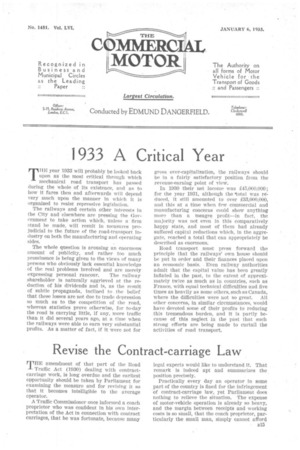1933 A Critical Year T II.,E3 year 1933 will probably be
Page 29

If you've noticed an error in this article please click here to report it so we can fix it.
looked back upon as the most critical through which mechanical road transport has passed during the whole of its existence, and as to how it fares then and afterwards will depend very much -upon the manner in which it is organized to resist repressive legislation.
The railways and certain other interests in the City and elsewhere are pressing the Government to take action which, unless a firm stand be made, will result in measures prejudicial to the future of the road-transport industry on both the manufacturing and operating sides. .
The whole question is arousing an enormous amount of publicity, and rather too much prominence is being given to the views of many persons who obviously lack essential knowledge of the real problems involved and are merely expressing personal rancour. The railway shareholder is naturally aggrieved at the reduction of his dividends and is, as the result of subtle propaganda, inclined to the belief that these losses are not due to trade depression so much as to the competition of the road, whereas statistics prove otherwise, for to-day the road is carrying little, if any, more traffic than it did several years ago, at a time when the railways were able to earn very substantial profits. As a matter of fact, if it were not for gross over-capitalization, the railways should be in a fairly satisfactory position from the revenue-earning point of view.
In 1930 their net incothe was f45,000,000; for the year 1931, although the total was reduced, it still amounted to over £33,000,000, and this at a time when few commercial and manufacturing concerns could show anything more than a meagre profit—in fact, the majority was not even in this comparatively happy state, and most of them had already suffered capital reductions which, in the aggregate, reached a total that can appropriately be described as enormous.
Road transport must press forward the principle that the railways' own house should be put in order Enid their finances placed upon an economic basis. Even railway authorities admit that the capital value has been greatly inflated in the past, to the extent of approximately twice as much as in countries, such as France, with equal technical difficulties and five times as heavily as some others, such as Canada, where the difficulties were not so great. All other concerns, in similar circumstances, would have devoted some of their profits to reducing this tremendous burden, and it is partly because of this neglect in the past that such strong efforts are being made to curtail the activities of road transport.




























































































